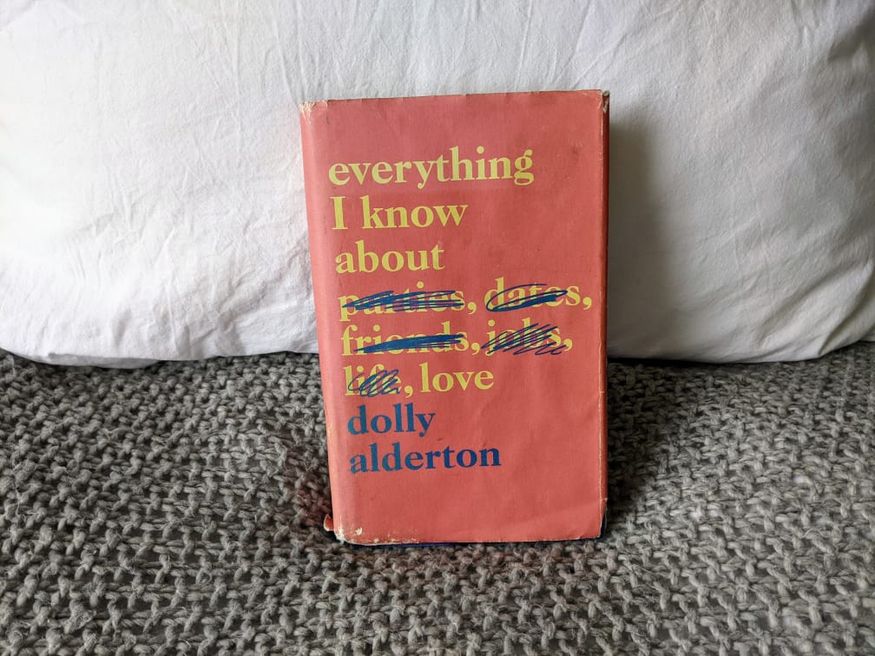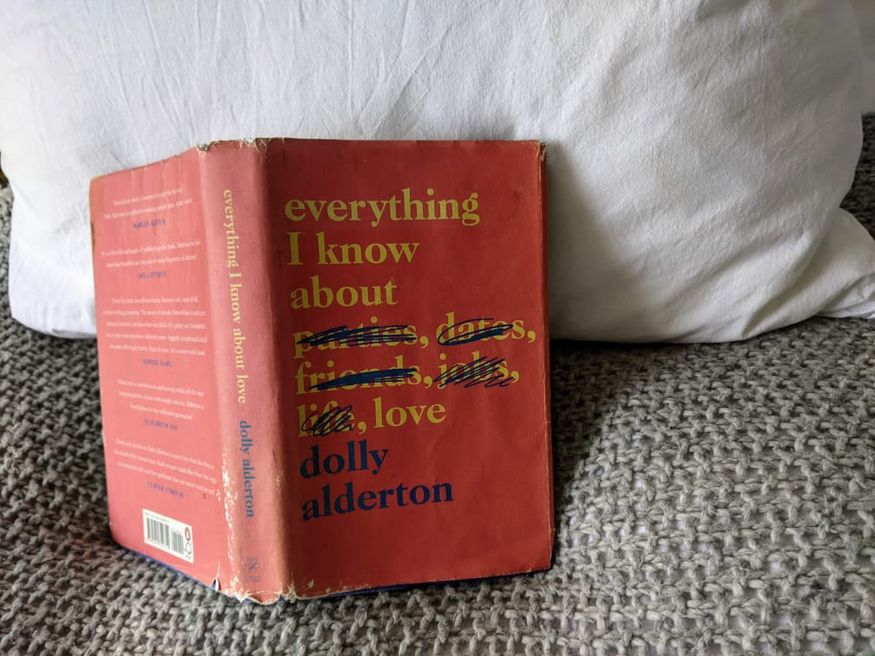5 Biggest Lessons From ‘Everything I Know About Love'
Published on 12/15/2021Last week, I was tucked in bed with a bad cold and feeling pretty mopey about it. I didn’t want to start a new book, as I lacked the energy and focus to attempt a novel I had never read before. Instead, I decided to return to one of my favourite books and pick up ‘Everything I Know About Love’ by Dolly Alderton.
I first read this book in 2019, when it was gifted to me by a friend from London. She inscribed the cover and explained that everyone was talking about this book, and that she thought of me when reading it herself. From the first chapter, I was hooked. I devoured this book within days, snatching moments to read in the train, the bath and any waiting rooms. This tattered book ended up making the rounds of my entire friend group, and I even gifted a copy to two people that same year.
Why do I love this book so much? I like to describe this book as the memoir of an everyday girl. Dolly captures the unique atmosphere of your twenties: the love, the pain, the uncertainty, the false confidence, the wins, the losses, the grief, the triumph and more. This book is so unique because it takes you through moments, some that mirror your own and some that seem so shocking or humorous.
This book feels like a warm cup of tea on a lonely night; it feels like a reminder that everything works out in the end. Dolly doesn’t speak at you; instead, she speaks with you, and here’s what she has to say:

1. Love isn’t what you thought it was
From the title, you’d expect this novel to be a collection of her dating history and various partners. And whilst Dolly does discuss the dates, hookups and relationships, she demonstrates that love isn’t just romantic. Towards the end of the book, she takes an entire year off of dating and even thinking about it, to be comfortable on her own and find herself again. She then has an exquisite passage in which she explains that whilst she doesn’t know the intricacies of a romantic relationship as well as others, she knows the strength of love through her friendships. She knows them better than she knows herself, their habits, preferences, tastes and more. The real love of your twenties isn’t the people you go to bed with; it’s the friends you surround yourself with. A long-term relationship with a friend is still a relationship and something to be cherished over the years.
But even romantic love isn’t what you may have once thought it was. It isn’t just passion or fireworks, and it isn’t just security; it’s vulnerability, it’s knowing someone so well yet still knowing yourself.
“And I also know that love is a pretty quiet thing. It's lying on the sofa together drinking coffee, talking about where you're going to go that morning to drink more coffee. It's folding down pages of books you think they'd find interesting. It's hanging up their laundry when they leave the house having moronically forgotten to take it out of the washing machine.” ‘Everything I Know About Love’ by Dolly Alderton
2. Friends are everything
On that note, one of the biggest lessons from Dolly’s book is that friends are truly everything. Not only does she say this explicitly in the final pages, but it is implied throughout. She tells her story, but it’s not just her story; it’s everyone’s story. Dolly’s story is so intricately tangled with that of her friends, through the relationships she witnessed, the tears she wiped away, the birthdays she celebrated. Our lives are a patchwork of our friendships and relationships.
Reading ‘Everything I Know About Love’ was like a love letter to friendship, and by the end of it, I wanted nothing more than to go and remind my friends how much I appreciate them.
“Nearly everything I know about love, I've learnt in my long-term friendships with women. Particularly the ones I have lived with at one point or another. I know what it is to know every tiny detail about a person and revel in that knowledge as if it were an academic subject. When it comes to the girls I've built homes with, I'm like the woman who can predict what her husband will order at every restaurant.” ‘Everything I Know About Love’ by Dolly Alderton
It can be easy to look at your twenties as a time for one-night-stands, dates and partners, but don’t forget it is a decade of friendship. It’s about the people you start your night with, not just the one you end it with. It’s about the people you reveal your true self to, the ones who get to see the best and worst of you.
In the book, Dolly covers a lot of challenging moments, including breakups, mental illness and loss, and through that, she reminds us that with friends by your side, you are stronger than you ever thought possible.
3. Learn to be alone
As mentioned, Dolly takes a year to be truly alone. She hasn’t been in very serious relationships for most of the book, but even so, she acknowledges that she wasn’t really alone. We think that being single is just being out of a relationship with labels. But if that time is spent in situationships, scrolling through dating apps or always keeping one drunken eye on the prowl, then you’re not really alone.
I think we’re often scared of being alone. We were raised to put our self-worth in the hands of whoever wants us, so without that desiring effect, what do we have left? It’s scary, but I genuinely think that everyone has to be alone at some point. Not in-between relationships, not dating, not looking to be loved, but simply on your own. It allows you to meet yourself more intimately than you ever have. It enables you to accept yourself without the influence of another.
“Dating had become a source of instant gratification, an extension of narcissism, and nothing to do with connection with another person. Time and time again, I had created intensity with a man and confused it with intimacy” ‘Everything I Know About Love’ by Dolly Alderton
Dolly explains that this renewed focus allowed her to enjoy her life, enjoy moments, and not always be looking for someone. That she finally found herself to be enough, so that anyone she met after that would be an addition, not completion.
4. Perspective is power
You will make mistakes. There is no way around it, not if you’re living your life. You will make mistakes, and at the time, it will feel like the end of the world. But give it a day, a week, a month, a year, and you’ll realise that life went on. When something terrible happens to us, it doesn’t feel that way; it doesn’t feel like another sunrise will happen, like time can ever keep passing, but it does. So we get up, and we try our best.
Dolly gleefully takes us through her mistakes, and she more carefully tiptoes us along her worst moments, the kind that makes you want to curl up and forget that the sun will rise again. Dolly shows us the worst and, through that, reminds us that everything becomes okay again with enough time.
A prominent theme of the book is perspective, and this is visible in the sections in which Dolly addresses everything she knows at each age, from love to loss, friendships to faking orgasms and more. These sections are refreshing, as they make you chuckle when you recognise the naivety you also wore at that age. These lists also serve to show the growth we experience in our twenties, the phases we pass through, the lessons we acquire. It reminds us that something that feels huge at twenty, won’t feel that way at twenty-eight. How you act with a partner at eighteen will be very different from when you’re twenty-five.
Rereading this book reminded me to take the perspective I need, to take that step back from the present and look for the bigger picture. Life is short enough to treasure it but long enough to apply patience to your wounds.
5. You can’t escape your problems
Within the book, there is the recurrent theme of escapism. We all remember being teenagers and wanting to skip this part, to escape to the chapters where we’re adults who can supposedly do whatever they want. Dolly captures this teenage angst perfectly, how it led her to flee to a boarding school to be around guys, how it led her to leave home the moment she could.
A key aspect of Dolly’s writing is her stark self-awareness, something she’s achieved after years of reflection and writing, and a good ol’ dose of therapy. She now recognises her heavy drinking as an escape. She notes how she used men and sex to escape further. She was on the hunt for the best drunk stories and adventures, merely to run from how inadequate she felt inside.
Dolly considers moving to New York at one point, as she feels so miserable in London. But once there, she is just as sad, because she can’t run from how she feels, it will merely follow her along.
“A week into my big New York adventure, I realized that places are kingdoms of memories and relationships; that the Landscape is only ever a reflection of how you feel inside. I felt more empty, tired and sad there than I had been feeling at home. The fantasy of moving faded day by day. I had the insidious epiphany that ‘Tottenham Court Road and Amazon’ would follow me wherever I went - I was still the same unfulfilled person on holiday as I had been in my house. When I booked the flights, I thought I was booking a trip out of my head, but I wasn't.” ‘Everything I Know About Love’ by Dolly Alderton

If you’re looking for a book that isn’t self-help but somehow still assists you in becoming more self-aware, then look no further than ‘Everything I Know About Love’. It’s the gentle reminder you need that life isn’t perfect, love is so complex, and that you’re going to be just fine at the end of the story. Or you could just wait a year or two, as Dolly has just written the script for a series based on this incredible book!
This article contains affiliate links.
Featured posts

Fleur
Welcome to Symptoms of Living! A place where I like to relieve myself of the barrage of thoughts and ideas filling my mind. Here I'll take a look at various topics, from books to BPD, series to self-harm, there's nothing that we can't, and shouldn't, talk about.
Having struggled with mental illness since the age of 15, one of the hardest parts was how alone I felt in it. While mental illness is beginning to be discussed more openly, and featured in the media, I still think there is room for improvement. So whether it is mental illness or merely mental health, a bad day or a bad year, let's make this a place to approach it and strip it back. Everyone has their own symptoms of living, and you certainly won't be the only one with it.
Would you like to receive my top monthly articles right to your inbox?
For any comments/questions/enquiries, please get in touch at:
info@byfleurine.com
I'd love to hear from you!